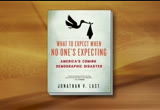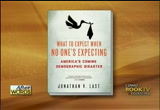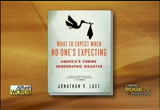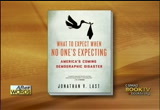tv Book TV After Words CSPAN February 2, 2013 10:00pm-11:00pm EST
10:00 pm
things to -- and identify with these particular lawyers so to be this kind of a lawyer thurgood marshall and people like him was not just to be an african-american lawyer for but someone in the white world. see how difficult was it to become a lawyer during this time? >> it's not difficult to become a lawyer. you have to go to law school like everybody else and it does cost money so, but it's very difficult to see it as a lawyer because no african-american lawyer is going to have wide clients are very few will have white clients. most like people don't have a lot of money and if you have money and you are lack you hire a white lawyer because of course white voters will be more effective in a segregated society. so it's very very difficult to succeed as a black lawyer. >> why these six men? >> they have something in common. they are all one generation.
10:01 pm
they all wear the foot soldiers as you well. they were all the legal arm of the sabar is so just as the sabar rights movement was getting going in the 50s and 60's these particular lawyers were really at least -- of their careers and they became the evil arm of the sabar rights movement. >> kenneth author of the new book representing the raise the creation of the civil rights lawyer published by university harvard press. >> up next on booktv after words with this week's guest d'vera cohn. "what to expect when no one's expecting" america's coming demographic disaster. a in it mr. last discusses the population implosion in the u.s. and its impact on the economy culture and politics. this program lasts about an hour
10:02 pm
>> host: jonathan welcome. this is a very meaty book and there's a lot going on in here. the main thesis of course is the falling birthrate problem and what are the causes of those falling birthrates and the consequences. the rising individualism and and american lives in the sustainability of religion and population agents. we will get to those during the next hour but first why don't you answer for me the question of every reporter has asked by his or her editor when that reporter approaches with a story idea. why does this matter? why is it important? >> guest: it's important because the fertility rates and demographics are what my friend and demographer in town here says it's like the tectonic plate shifting beneath the earth and demography isn't quite destiny but it's close. once you know what the
10:03 pm
demographic profile country and society's going to be then you are able to tell what are the confines in which this reality will have to live in the country? so what we have seen now in the global phenomena is everywhere from sweden to america and canada to i ran to singapore is people choosing to have fewer and fewer children. this is the first time in human history that this is happen voluntarily on a global scale and it's going to have far-reaching consequences for everyone. >> host: well how do we know that fertility is -- that is how is it measured and are we talking about a year or a few years or decades, centuries and where is it happening? >> guest: so the phenomena has begun in the west. it began around 1970 and two backup quickly the more -- the way we measured this is by statistics. it's not terribly difficult to do when you have societies to keep track of these things any know how many people there are
10:04 pm
and how many people are born each year and with the ages of their parents are and from those you can calculate a number of different metrics like crude birthrate, the general fertility rate and then finally the total fertility rate. a total fertility rate is not the real number in the sense that it's it is the hard and fast number and the statistical construct which means basically right now at this very moment in time if everyone am and where to live to the end of her life having an average number of children what would that number be? in america right now that number is 1.93. the golden number for us the golden in all demographics would be 2.1. 2.1 is the replacement rate and in order for society to maintain its population average woman has to have 2.1 children over the course of her lifetime. if the average woman has more children than that the size of the population grows and if she
10:05 pm
is fewer than that in overtime the population contracts. >> host: now has this been going on and you mention 1970 but to some extent the process has been going on for centuries the fact that birthrates birthrates have gone down. >> guest: you see the first good data on fertility rates comes in the 1800's and from all that is happen you are able to see the fertility rates declining and by the time we hit the second world war we were right around 2.1 or 2.2 and then immediately after the second world war we had the only major instance of an increase in the fertility rates in the entire country's history and that is the baby bombers. everybody knows about the baby boomers. it really was a remarkable moment because not only did the fertility rate freeze quite high and went up to his height is 3.7 i think for white americans and 3.9 for black americans, not only did it jump up but it
10:06 pm
stayed up for an entire generation. it was a long-lasting effect and people change the way they lived for a generation and then by 1970 that momentum that moment ended and we saw not a gradual slowdown but tafford to levee rates dropping off and when this happened it happened everywhere in japan and canada and happened in germany and in the united kingdom france and america. it has continued to slide. what's interesting is that since then the west has led what is called the local fertility fund and since then you have seen all the other countries began to follow them. right now 97% of the world population lives in a country where the fertility rate is declining. it happened in south america as i said in an africa europe and asia and what is really striking and what people don't typically pay attention to is that while in many parts of the world the actual fertility rate is a little bit higher than it is here in america the rate of decline is generally steeper and so if you look down in mexico
10:07 pm
and central america and south america while many of those countries find fertility rate slightly above what we have their rate of decline is sleep -- steeper said he can't just look at the numbers you have today. we can't just look at the snapshot. we have to look at the trends and watch the slope of that curve to see where we will be in another 20 years. >> host: are there certain groups here in the united states or other countries who are having more babies than other groups who are conversely groups where the fertility decline is more apparent? >> guest: there are and just to take america, of fertility rates are never constant across populations. 1.93 can america is the average. we break that out by different demographic groups in different numbers. the white americans have the lowest fertility rate at around 1.6 and african-americans have what we think is a very healthy rip civility rate of 2.0 and
10:08 pm
hispanic americans have a high fertility rate of 2.35 right now. so really the only reason our fertility rate is not much lower than it is because the hispanic americans are doing all the heavy lifting and having all the babies that no one else is willing to have right now. but this is a problem in a real problem in america because we are so dependent on the fertility of hispanic americans but again the fertility decline of the hispanic americans particularly foreign-born hispanic americans is incredibly steep. the pew center surveyed a few months ago showing that over the last three years between 2007 and 2010 mexican born americans fertility decreased 23%. that's an astonishing return to the mean and so again looking at not just where we are now but where we are going in the near future and what this suggests is all these groups are following white americans in following middle-class americans back down towards a much lower fertility
10:09 pm
number. >> host: we will take up the issue of immigration later because i think it's what some people have proposed as a solution in part to some of the falling fertility but for now it's also talk a little bit about the larger population processes leaning towards these declining bursts. certainly we know what happened recently but going back in time a century or two, talk a little bit about the larger forces at work. for example many demographers say one reason birthrates began going down is because there were fewer infant deaths and there were improvements in the fight against infant deaths and that helps parents be able to have smaller families. >> guest: one of the things i say in my book is that what you are saying is in some conspiracy. it's not as though their secret forces trying to lower fertility. but what it is the net effect of the giant constellation of sources that have nudged us in this direction to have fewer
10:10 pm
babies and some of these forces i would say it are the breakdown of the family unit but some of them are wonderful and one of those is that what you just mentioned the decline in them that mortality. infant mortality numbers and 18th century in 18th century america and europe for astonishingly high. it was gruesome to try to have a baby back then and in for mortality shrunk to what it is today to almost nothing which is again a wonderful development. enable people to have fewer children because they were able to get more children to an adult age. you have other forces like urbanization. we are now a much more of an country than we were 200 years ago and when you look back at the numbers and the research you can see the effect of urbanization on fertility rates even as far back as 1800 america when there were much higher fertility rates is it and soon
10:11 pm
to become new york city. as you have the more urban country into lesra my country a country where children survive at a much higher rate, you are naturally getting people to have fewer babies. again these are good effects. that is one of the things i try to mention in the book is that to observe that with the overall effect on this creates problems and that isn't to say everyone is itself a problem and some of them are wonderful things. even wonderful things can have ill and adverse effects. >> host:>> host: why would urban lower fertility? >> for lots of reasons. one of which is cost. when you are but nice everything costs more. the higher your population density the higher your cost of living and higher land costs hired childcare costs and higher education cost and not just that but if we look back historically and we move from an agrarian
10:12 pm
society to an industrial society children are free work, right? you have seven kids and to work on a family farm and by the time the kids are 10 years old there is a helping hand. when you live in the city and working in factories and doing increasingly mechanized work children are not that help. they are simply a cost. this is one of those factors pushing us in that direction. now another big change is the nature of the welfare state. this is something which didn't exist in ninteenth-century 19thy ninteenth-century america. we were basically on our own. as we got older children to care of us in one of the basic reasons to have children. you have a gaggle of kids and you hope that one of them at least it's a good one and will look after you. and now we don't need to have that anymore. we have social security and medicare. it's still nice to have a child ... and to look at you as you begin to drool and watch more
10:13 pm
jeopardy but it's no longer necessary. all these little things and these tiny changes, some bigger and some smaller have pushed us in the direction of having fewer and fewer children. >> host: back to the issue you raised about the cost of children. you. you in fact mention this throughout the book. you talked about the increasing price of a child such as $1000 drillers for parents who want to get into that as well as some of the figures on the cost of raising a child. could you talk about that a little bit and how that might be affecting people's decision? >> guest: this is a family show and i don't know but can mention these numbers but it really is striking. it's not just a thousand dollars drillers and the 1400-dollar cribs. i found a 50,000-dollar backyard playset which was one of the most amazing things i've ever seen but even michael bloomberg doesn't even need a 50,000-dollar backyard playset. so the government has kept track
10:14 pm
of children since 1950 and what they have found is that the cost has increased in real dollars and constant dollars not just with inflation and enormous degree. today, if you count college tuition and the forgone wages of the parent which is not to say somebody stays home full-time for all 22 years, but if you have a baby and then you take off for the first six years until the child is in school full-time and he returned to work, either part-time or full-time increasingly the average cost can be about $1.1 million per child. that is a staggering amount of money to spend on you know someone who when they are 16 say that they hate you. and it's not just that. you put that in perspective for the average cost of a home and the median cost is about $200,000. it's like buying five houses all at once and you can't sell it. and you can see, people aren't
10:15 pm
crazy. there is is the reason they aren't having children anymore. even if you aren't a 50,000-dollar backyard playset in going to thrift stores and taking handmade down clothing from a family costs a lot of money to have children. >> host: you also mentioned car seats and the complications of finding the right one and installing it and so forth. where does that fit in? >> guest: car seats are a fascinating tributary about this and i said they are a giant constellation pushing us towards having fewer children. one11 of them and it's a tiny fe and so tiny we couldn't measure it, car seats. you and i did not write in car seats almost certainly i would guess but if you were a child before 1970 you almost certainly never rode in a car seat. he said in your mother's arms or your father's arms or you just rolled around in the backseat and you are fine. we made it and we are here we are here today and we are fine
10:16 pm
but he getting in the 1970s a couple of people in tennessee a physician and a legislator, got together and they got it in their heads that it was unsafe for children to be carted around in cars in this manner so they worked hard to pass a law requiring car seats. this is good. we like car seats and it turns out they are safer than rolling around in the backseat and they saved quite a few lives. about 7000 lives since 1970. but, they impose a small cost because you can't get a free car seat for a midsize sedan so if you want to have a larger family and today three children counts as a larger family, you need to spend a lot more money and get a bigger car. this is the biggest tax in the world but it's a small tax and one of the measures with a car seat is pro-child and objectively anti-family. >> host: what about some of the other social forces leaning in this direction? for example working women, women
10:17 pm
going to college and all those things pushing us toward a world of having a child could be more difficult for some. >> guest: it could probably be run up against biology. anything that pushes your average age of first births backwards ultimately is going to push you to have fewer children. the average age of first birth is about 28 years old, 29 years old. it used to be about 22 and part of this as we is we made college virtually required for middle-class both men and women and as you push back the age of first family formations of people can really think about getting married right out of college to 22 and april used to be married and settled and ready to begin family life. again you start pushing that horizon where you might be having children further back and this causes if you want to have a bunch of kids close together which only crazy people like my
10:18 pm
wife and i have done, it becomes a lot harder and people wind up having fewer children. one of the things you see in america's people have on average fewer children than they wished they did. are average idea fertility, the number that most people say is perfect as 2.5 and again our actual fertility at chief fertility is a whole half of a kid less than that and modern life has aspired to say it's not responsible to have a kid before you are married and you have your first real place. is not responsible until you have a good job and you can't get a good job and take graduate from college and all these things start backing up and backing up until you are not again and family life until a times when you are 30 or 32 years old. >> host: we certainly see the median age of first marriage for both men and women is in the late 20s unless you are going to have a child without being married that is pushing off childbirth even more.
10:19 pm
jaczko at pushes it backwards and it's interesting, some of the stuff becomes counterintuitive. i think a lot of people might as soon that is women have been pushed into the workplace in greater numbers they think we are 70% of women work outside of the home and that will contribute to fertility decline. and maybe it does but maybe it doesn't. the data is very ambiguous. there is researched on the chest that countries with higher participation rates and women in the workforce countries like france and sweden and norway have much higher fertility rates than do what we think is traditional gender role countries like greece and italy and spain. so i try to come back to this in the book you should always look to the data because the data will tell you things that you might not intuitively think about. >> host: some of the thinking behind at least some democracies feel like countries like france or the nordic countries maybe
10:20 pm
make it easier for women to works of their more inclined to have a career and children. to to do you think that might be the case? >> guest: it's tough to say. there's a good deal of research on that's so it's a really fantastic bit of research done on the net effect in state spending for the most part means things like we see in nordic countries and france where you have government rent daycare centers where your taxes pay for government daycare center so you can drop your kids up while you go to work and pay your taxes. and it shows that the actual effect of this is pretty small and fertility. for. for every 25% increase in government spending you get about a 0.6 increase in the fertility rate in the short-term. so what is the real difference then between france and the nordic countries and countries we see in southern europe where fertility rates are much lower around 1.3 to 1.5.
10:21 pm
and the difference is cultural. you have places where there is a really long-standing commitment to trying to make family life work and france in nordic countries have been obsessed with all the demographic stuff. right after the first world war, so it helps for a country to take these things seriously over the long-haul in the demographic thai. >> host: i'd like to come back later to some of these things that countries are trying and what works and what doesn't but let's back up a little bit and talk more about costs. what role does religion play? it seems to be an important predictor in some sense on who is going to have children and who's not. that is not religion in the sense of belief but in terms of attendance at church services or other participation in religious life. could you talk talk about talk about that a little bit? >> guest: this is fascinating actually because it really has change. if you go back and look at the
10:22 pm
national art of statistics reports from the 1900s what you see as classifications of fertility by religious sect. the. the democracy in america were assessed about catholics and protestants and as it happens there have been enormous demographic splits. over the years, fertility increase until they met together and a lot of demographers that this was the end of catholic fertility and catholics were no longer special but it says something more interesting happen. what happened was it no longer mattered what your actual belief was. as a matter of fact if you are jewish or muslim or mormon or catholic or protestant, all that mattered was how often you attended your services. there is a real straight line between increased fertility and church attendance. so if you go once every two months fertility rates are higher than if you don't go at all and if you go once once a
10:23 pm
month it's higher still and if you go once a week it's higher still. not only is your fertility higher but your ideal fertility. people who go to church of some sort want to have bigger families and people who do not. so you have got this real split in america now between secular america were not only are the fertility rates much lower and ideal fertility is much lower and believing religious america where people not only want it or families that have bigger families. if you look at it anecdotally here own life experience when was the last time you saw a family with six or seven kids that didn't go to church every week? there art the general social survey this giant longitudinal survey of 70,000 families and if you dig through the cross tabs you can look at the number of people who have four or more children and then look at them by church attendance. the number of people with four more children who never go to church is exactly zero. >> host: wow.
10:24 pm
of course it's an important role in reinforcing family dynamics and encouraging a community of pham -- community who have children and are have set encourages families to have more of them. >> guest: i think so. to a lot of the extent having a kid is a raw deal. it's not a lot of fun and there's a ton of research on the study which suggests that when you take any two people who are typical in every way, the same race in the same religion in the same income one of them is apparent in one of them is not apparent. apparent will be six percentage points less happy than a non-parent and that makes sense because having a kid is not a barrel of laughs. it's a lot of hard work and this is why it's very difficult for governments to bribe people to have children.
10:25 pm
all the late nights and the diapers and a i hate it when they are 16 and all that stuff. but you can argue having children i think and i think this is largely what churches do. they don't argue that you should have children specifically although some religions do about the whole purpose of religion regardless of the belief as to suggest there's something bigger than you and i at this moment. that is really the prerequisite to give up your life as you know and have a child now. you believe there's something bigger and more important than what you are doing right now so it's okay to give up your own happiness because you are doing a service of something bigger. >> host: let me raise an issue that could be a little delicate. there have been commentators throughout history who have talked about fertility and framed it in terms of either the wrong people having children or the right people not having enough of them.
10:26 pm
what are your thoughts on this or could you talk a little bit about how this issue is played out? >> guest: it's hard to look at any part of the history of demographics and not see any of this. i refer you to the eugenics movement and it begins with -- and paste all the way through margaret sanger who is a member of planned parenthood. and she conceded that the birth control as a means to have fewer children from the unfit as she put it and when she talked about and that she talked about people in the jungles. it's really grotesque stuff. one of the happy things about our giant fertility collapse is it seems everybody is having fewer children now. it's hard to look and say well these people are having too many or those before having too many because no one is having a lot
10:27 pm
of children anymore as it is. there was his threat to this undercurrent throughout a lot of demography about you know the undesirables having too many children and you see it even in a non-racist way but a slightly ugly way and despite a theocracy which is a classic that came out 10 years ago in the thesis that a theocracy is that smart people aren't having enough children and the people -- the world is run by idiots. it's a funny premise in some way. actually the movie is funny but it's also wrong. all the people that this movie looks down on as the people having too many children, they are not having too many children in effect they have cut back on fertility as well. and austrian demographer did a really interesting study five years ago looking at over the course of 700 years, 900 population datasets and what he
10:28 pm
found his fertility has always been aspirational behavior and something that people want to do in emulation of what they thought was right. so for several centuries delete backwards a word to a level of the elite and didn't have the money. they couldn't afford as many children as the elite could and when the elite began cutting back on having children in the early 18th century what happened was the poor people, the lower classes they followed their lead in the two groups have been headed on the same slope, headed downward. >> host: you have probably read this i have about some of the work in purcell in that country's fertility rates. it turns out that one of the reasons that they cite is that all the soap operas that are on television show well off with either no children and assist permeated the culture and the
10:29 pm
other women who are less well off want to have smaller families. >> guest: the research in purcell is fascinating. television came to the rural parts of the country. as this town got its television and started looking at television, what were the fertility rate somewhat happened with the fertility rates in the next few years and it could literally watch and see these maps were as television came to a town the fertility went down. as television came to the next town fertility rates went down. is this larger cultural force were all these things are lining up together suggesting that hey it's its fine attack its. >> host: let me pose one explosive question before the break which is to what extent does this falling fertility depend on women's greater aspirations for work, more flexibility in their lives and to what extent should women curb those aspirations and i'm posing
10:30 pm
this is a rhetorical question. i don't suspect that you believe they should. >> guest: well it's complicated. one of the interesting things as we look at the ideal fertility numbers many women tend to want the same number of children here in america. this is counterintuitive. you wouldn't necessarily assume that i think. the ideal numbers change over the course of your life. turns out as you are younger were younger you want fewer children as you get older you slightly adjust upwards in a number of children that you wish you would have had. if you look at men and women as they get closer to 40 there i'l -- ideal number begins to jump a little bit. the fact that in america we are underachieving our ideal numbers and particularly women who go to college and complete their college degrees and particularly women who have graduate degrees paisley underperformed their
10:31 pm
numbers in their lifetime. it's hard to say it's a case of them deciding that they don't want children. i think it's more the case that they are deciding they do want careers. they pursue their careers and it turns out we have erected this whole system of lifting to make it incredibly difficult to do both. i think any attempt to fix fix s going to have to work on removing some of these roadblocks and allowing people who do want to have children to find ways to do it.
10:32 pm
>> host: jonathan last there's something else going on besides falling birthrates that is also important and they play into each other which is what you might call the graying of america. that is the baby boomers getting old and 10,000 people a year turning 65 -- 10000 people a day turning 65. what are the implications of that for falling fertility? how do they reinforce each other or interact? >> guest: way for people to think about population profile is the populatiopopulatio n profile of a society which has just a 2.1 fertility rate a nice steady replacement rate is everything is nice and symmetrical until you get older and people start passing off to undiscovered countries and in the comes to a point where the population ages older. and a gray society you get an inverted pyramid and things are not terrible yet in america.
10:33 pm
if you look at a country like japan if really does look like an inverted pyramid. japan is going to have more people over 85 then people under 14 in about 10 years. this could cause a real problem. there are almost no examples of long-term economic peace and prosperity and intently gray society's. your graying society happens before your population contraction begins. you are upside down pyramid start dying off and more people are dying every year than being born so when you have a gray society you have a breakdown and you look at other consumer society's. demand start slacking for everything but basically health care. as demand start slackening innovation begins to dry up and there is not as much incentive and not only that but the age cohorts were inventions and entrepreneurship happen which is
10:34 pm
under 40 those cohorts are smaller and you have fewer people in the innovation stage in their lives. then you see what happens with capital markets. be have a lot of capital out there holding back risky things. the capital belongs to young people who are saving for the long-time horizon. bunch of the society that is very gray these people are looking to preserve their capital and then you begin drawing it down so capital flows began to sort of inverted ways that they don't traditionally work. finally have the military. once you have all this military -- money going to support the pension systems and social security and medicare for the older people you have less money for military and self-defense and not only that the viewer bodies in your pool of military aged men and women is smaller. this is not as much of a concern for sweden but for sweden doesn't matter if you can't support your military. if you are america and you are
10:35 pm
reasonably considered to be a force for enforcing stability it becomes problematic. >> host: well let me challenge you as little on that. we have pew research don't take positions on these issues but certainly there've many demographers and social scientists out there who say that the kinds of issues of population aging and falling fertility are a kind of the problem you want to have and that governments like the ones in the u.s. where we have resources could solve them and in fact there may be an advantage to having older people who can be persuaded to join the work horse or stay in the workforce longer and maybe wring more women and an train younger workers so they can become more productive. the thinking as well, this is what happens in a modern society. let's. let's live with it. what do you say to that? >> guest: well we will have to
10:36 pm
live with it regardless of whether we think it's a good thing or bad a bad thing. i would say it all depends on how deep the hole you are in. if you are japan where the fertility rate is 1.2 or 1.3 and their is zero immigration these are quite suffering from a lost decade but it they are suffering from from a demographic winter. they have not had gdp growth above -- and 20 years and there's no horizon to experience economic growth in the future. what's more things get worse and they wind up having the state fails and all sorts of generational warfare. just recently the finance minister of japan, it was time for the old people of japan to hurry up and die or go and so you wind up setting up this adversarial relationship between the generations we have the older people who need to be taken care of and certainly want to be take care of them deserve to be taken care of but then you have this dwindling supply of workers to support the men with
10:37 pm
worse you could wind up in a vicious cycle. so how do you as your retirement rate show the number of workers per retiree, as they get smaller you only have two choices. cut an eclipse to retirees or you can take more in taxes and your workers. of one of our problems and fertility is that we have made it too expensive to raise children and people don't have enough income to do so so and if that we have seen middle-class wages be stagnant since the 1970s. taking more taxes is a vicious cycle. taking more from your workers and a king at harder for them to have children and so it becomes dangerous sometimes to hope that we can muddle through. we may have to and a maybe the best we can do but again i would caution these are first world problems. first world problems are as better than third world problems and it's one thing to get old is your rich and quite another thing to get old when you are poor in the same thing we see
10:38 pm
here in america with regard to fertility happening all over the world. when this is happening sri lanka and i ran it's very different. they did not have pension systems we have set up and have civil society there to take care of the elderly. china -- china already has what is called a slow-motion human catastrophe where you are going to have literally hundreds of millions of people who are elderly with no state support whatsoever in terms of pension and health care and very little money to support them because they have this one-child policy and almost no progeny of their own. so what are the chinese going to do with her old people? it's a terrifying question. >> host: well, if you are convinced that this is a disaster of some kind what works
10:39 pm
and what doesn't? what can be done? what if anything can the government do to encourage women or families to have more children? >> guest: [inaudible] that is how we sell books. [laughter] people have been trying to do this for a long time. seasseas are augusta saw they ha fertility problem and the empire. he tried to get people to get married and have kids and it didn't work or that the soviet union had a fertility problem so stalin commissioned a motherhood medal giving it out to women who had five or more children. you can get them on ebay for $5 today night believe it or not and they are kind of nifty. they didn't work. as i said france in the nordic countries have spent the better part of 80 years working very hard and they have had very mixed success. in the nordic countries have fertility rates aren't all that high. countries on average have a fertility rate of 1.6 or 1.7. they are well below we are
10:40 pm
despite the spending. in france the fertility rate is much higher but all the evidence suggests that is because of immigration. that a great deal of immigration and the difference in fertility rates between native frenchman and countrymen is enormous. at least half of a kid and possibly more. this statistic coming from france or a little bit dodgy because they don't let you take the numbers explicitly by eraser or jim. what does it tell you? what works and what doesn't work? social conservatives, we like to think that everything is fine and we can just go back to traditional values but there is evidence to suggest that might not be true either. singapore looks like what would happen if rick santorum went on steroids and was able to do everything you ever wanted to do
10:41 pm
you have a full-time minister giving speeches 10 years ago about how single motherhood was terrible and the traditional family, we need to have more women having families. the stuff of social conservative dreams all coupled with really generous, generous government policies to help parents. big cash bonuses when you have a child. preferential acceptance to schools if you have two or more children. the government even went so far as to create 401(k) accounts for kids so when you put away $100 for diapers and the government will put in $100 to match, they have been to the type of thing that i think everybody loves which is they worked hard to relocate grandparents so the grandparents could be share the parenting could help with childcare. and the result of all of this project of saving the fertility rate for 20 years now is the
10:42 pm
fertility rate has gone lower. about 1.1, the lowest fertility rate in the hole left history. just because it has worked in singapore doesn't mean it can't work anywhere else but it does i think give you's. what i say in the book is that we need to be very modest i think in our goals and very modest in our ambition to have prenatal policies. the first rule is whatever you do you should do it for the long-haul and that is the success of the nordic countries and france. having delved down to the lowest low of 1.3 the ec in germany. so that this speaks to a culture that values the family and values children. but the other thing to do i think is to try to instead of incentivizing childbirth and instead of trying to bribe people into having kids that they don't want, what you really
10:43 pm
would like to do is remove the road box that exist for the people who are do you want children and to the extent that you can do that through policies which may not on their face be explicitly pronatalist, if you build more highways you improve access from the suburbs to the cities and make it easier for parents to get back and forth to their jobs than what you you can do as you can gradually make it a little bit easier for people who want to have children to go ahead and achieve their ideal fertility numbers and over the long-haul -- >> host: there are financial incentives that have been batted around. some talked about social security taxes and whether parents could be favored a little bit and payment and given some relief with that. what is your view on that? >> guest: there are dozens of proposals on social security and i think that would count. if we look at our free market in
10:44 pm
trying to remove artificial roadblocks social security as we discussed earlier is really in a sense of artificial roadblock coming in as an externality and if you think of it as a supply and demand term, and parents -- not children caring for parents as they get old social security is an externality that comes in and messes up that market. we will do that work for you. it doesn't matter whether or not you have children so to the extent you lose what you have, parents who are creating these children often future taxpayers who will support the social security system are going to the enormous expense of paying to create and raise these people and send them into the world to get good jobs and pay taxes. it would make sense in a way been to, while they are in the act of parenting for say 18 years to give them some relief. one of the proposals i like is you reduce it by one third for each child while children are around the age of 18. maybe that would do something for us. >> host: now that is on the personal level. on the policy level you raise
10:45 pm
the issue of immigration and how that is affecting the numbers in france. what about in the u.s. where there is a lot of interest now and overhauling our immigration policies and possible legalization of some folks who are already here. what is that going to do or what could it do or not to? >> guest: immigration is one of the variables where it's important direct nice that there are costs. even if you think in the balance it's a good thing. from purely demographic, straight demographic perspective immigration has been very good for america. and without it, without the immigration we have had over the last 30 years we would be where here at this right now. >> host: part of it is higher birthrate and more children. >> guest: we have 36 million foreign people living in america right now to give you some sense. their 4 million verse a year in american that is a decade worth of children. it's almost a decade's worth of
10:46 pm
warm bodies added to our profile that we did not make the old-fashioned way and that is good. without those people as they said we would look a lot like europe right now and that would be quite bad. immigration comes with all sorts of costs. immigration particularly illegal immigration has depressed the lower and if the wage scale and makes it harder to earn a living if you are at the lower end of the wage scale and causes problems with -- robert putnam wrote about this. it turns out immigration set of bringing everybody together it turns out it makes us a little bit more -- and less willing to join civil society. all this may be beside the point because from america we think about that is the demand side of immigration. there is a supply-side to it as well and the supply-side of it is, below the texas border down in mexico and central and south america fertility rates are falling. they are following very fast.
10:47 pm
within 20 years is likely that none of those countries south of the border going to the fertility rate over the replacement rate. historically countries which have the low replacement fertility do not send immigrants abroad rakove you see this already in countries which are below replacement south of the border now do not send immigrants in appreciable numbers any more. you see this with mexico. pew has done great work with this. mexico's retail in the -- fertility rate is just averaged above above the rating and in last three years we have had netzero migration from mexico and some of this certainly has to do with the great recession. i believe and a lot of demographers believe that this is the beginning of a structural rearrangement with mexico so to a large degree it's almost beside the point whatever what akel consensus become too in america. build a fence, don't build a fence ,-com,-com ma have an mistake, don't have amnesty. some point we are going to have people who want to come from south america anyway and at that
10:48 pm
point we will be in sort of a pickled. >> host: so we are cooked. >> guest: so we are doomed. >> host: let's back off a little bit. the world is never seen a type it type of population decline due to falling earth rate that you are talking about. certainly examples of population decline in the black plague and other things where that was a bad outcome. but do we really know the population decline as to be a bad thing? populations fall a bit here and there. >> guest: we don't know for sure the things i try to say in the book often is that we don't know anything for sure. what we know is the snapshot we have in front of us right now. we don't even know for sure if the population is going to be in the decline. take a country like poland.
10:49 pm
it is i suppose possible that beginning tomorrow people in poland will decide to start having four babies per woman and i think it's an exceedingly unlike abutt is possible. a few big and in the 1960s in the middle of the baby boom looking at what would happen to the american fertility rate you would not have believe what would happen is what happened where we fell off the demographic cliff in 1970. we are always a little bit honest about these protections and we know it's going to have been. we don't. we know how many people are born today and how many people are within the reproductive age. we know the size of the cohorts and they know what the slope of those lines have been up into the this point. so that is the temporary caveat. but as for the doom, i think that you would have to believe that this time will be different. you would have to believe that all the prior evidence of societies which go into population contraction and immediately experience economic
10:50 pm
stagnation and instability, you have to believe that all -- that was the past and this time will be different. that is the sixth most dangerous word in the english language. i'm a little nervous to do that. as i said before its different depending on where you are. china's experience is slated to be really quite disruptive and you would not want to be in china particularly as an older person over the next 30 or 40 years. but if you are in sweden and things go south or in american things go south that could be better. we could only have the collapse of the welfare state or social security entitlements or something like that. we would not like to have that right now but it turns out we may be lucky enough where we don't. >> host: you don't think it's a country with resources and time we couldn't manage this better? >> guest: the truth is if we stayed where we are now, if we stayed at 1.96 or 193 where we are today we could probably
10:51 pm
weather things okay and we have a large immigration that will last another 10 or 15 years. we are recently despite what our political culture looks like in a day-to-day basis is a reasonably stable place. people respect elections and we have a working judicial system and all that. but what if or not? as i said fertility has long been aspirational. a fertility rate for college-educated and graduate school educated women have been declining and continued to decline. this is really striking. for white college-educated women their fertility rate is 1.6. in china where they have had the one-child policy for the last 20 years, brutal policy in which they porch women into a portions and a a tax and financing of too many children they fertility rate is 1.54 the rates are almost identical. if everybody else keeps diving toward the bottom and we keep
10:52 pm
heading towards what they call the lowest low replacement which is where most countries eventually have, becomes much more difficult promises -- and a proposition to manage the decline. >> host: you to talk about in your book the way that politics and fertility interact. that is people who have big families verses those who have no children or small ones. could you talk about that a little bit? >> guest: a book called the big sort and the thumbnail of the thesis was basically this. driver in the neighborhood and look at the neighborhood itself and you can tell who that neighborhood will vote for in a presidential election without talking to anybody. there is a whole foods in op-eds bobbin you will look at the neighborhood and say that neighborhood is going to go for obama. if instead they instead they are churches and playgrounds and candor care centers you can be
10:53 pm
reasonably sure that town will vote for mitt romney. turns. turns out that is totally true. we have asserted ourselves to an enormous degree since 1970% edge of what are called landslide counties, the counties which overwhelmingly for one candidate verses the other in a presidential election has increase. -3/4 of the country is in a landslide county. for that reason we look around and think we are more polarized and we have sorted ourselves into these little communities. a point that bishop was made in that i agree with is we are not doing this on the basis of politics. but we are doing it on the basis of lifestyle and to a large degree the lifestyles of america are organized in round whether or not you will have children. if you are not going to have kids you can live in brooklyn and have nothing but pubs and bowling alleys and bookshops around you and life is great. i'm not looking my my nose down to what that life is like if you decide you will have a couple of kids and send those kids to
10:54 pm
school and it helps to be near a bye-bye baby and make sure you are in a good school district, you make a whole different series of life choices and you wind up. i see this amount my foot in my wife and and i were in this. maghrebi didn't have children, we lived in this wonderful suburb of washington which john kerry carried 80/20 or something like that. can we had pet spas and gas drove spas. we had her children and move to the excerpts which george bush carried 80/20. there is a big roadside that says watch children entire community because their kids running around everywhere. people as bill bishop noted moved into these little communities. >> host: does that have to be that way? >> guest: i don't know on that's an excellent question. we kind of wish it wasn't that way. i. i think most people wish it wasn't that way but this is part
10:55 pm
of what has happened i think with increasing mobilization in america. if you go back a generation, or two generations i suppose you would be in a town a suburban town in pennsylvania or new york state and on any given street you have people from every single age group living there. you would have the old people who have been in the neighborhood since they were born in people who are older in people in the middle childbearing years who are just starting out and people didn't just pick up and move. people basically settled around where they were born and raised. once you introduce the notion of mobility and people can -- they grow up in one place and settle in another, i think it becomes hard to avoid sorting ourselves out then. >> host: you do have a theme throughout your book about -- i don't want to say unpleasantness of raising children but how it has to be a choice not for the squeamish. and i guess if we could close this hour, with i guess you are
10:56 pm
rousing defense of why one should have children, -- >> guest: i will close with this. my friend p.j. o'rourke said this. the only thing worse than having children is not having them and i think this is true. having children is in many ways a soul crushing endeavors but it's a wonderful and noble soul crushing endeavor. it speaks to a deep and important way the human experience and the human experience extending beyond itself. if you believe in anything being bigger than yourself and it doesn't have to believe -- be what i believe and are you believe them but america can be secular humanism but believing in something bigger than itself then it comes on avoidable that at some point you say i have to have kids. >> host: thank you jonathan last. >> guest: thanks.
10:57 pm
>> that was jonathan last and booktv's signature program in which authors of the latest nonfiction books are interviewed by journalists public policy make year's legislators and others familiar with their material. after words airs every weekend on booktv at 10:00 p.m. on saturday, 12 and 9:00 p.m. on sunday in 12:00 a.m. on monday. you can also watch after words on line. go to booktv.org and click on subone in the book tv series and topics list on the upper right side of the page.
130 Views
IN COLLECTIONS
CSPAN2 Television Archive
Television Archive  Television Archive News Search Service
Television Archive News Search Service 
Uploaded by TV Archive on

 Live Music Archive
Live Music Archive Librivox Free Audio
Librivox Free Audio Metropolitan Museum
Metropolitan Museum Cleveland Museum of Art
Cleveland Museum of Art Internet Arcade
Internet Arcade Console Living Room
Console Living Room Books to Borrow
Books to Borrow Open Library
Open Library TV News
TV News Understanding 9/11
Understanding 9/11


























































